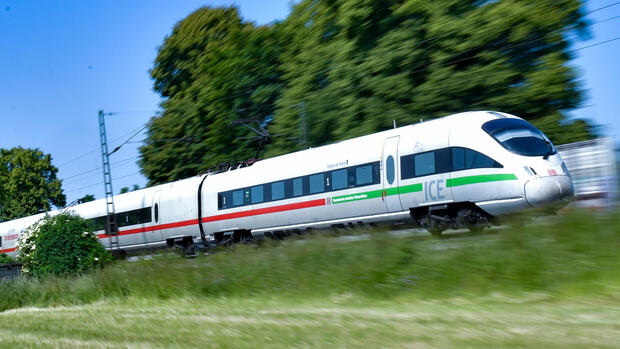Even after five days of constant talks between the railway management and the railway workers’ union EVG, no solution was found.
(Photo: Blatterspiel/Jan Huebner)
Frankfurt For rail customers, it remains unclear whether there will be further strikes. Even after five days of constant talks between the railway management and the railway workers’ union EVG, no solution was found. Both sides adjourned on Friday evening. The negotiating marathon is set to continue in the coming days.
After all, as long as both sides talk to each other, there should be no labor disputes. But no one can currently say how long the negotiations will last. If it declares one side to have failed, work stoppages are possible immediately.
The statements made by the negotiators on Friday evening sounded as if a solution were possible. “We have reached an understanding on many issues,” said Bahn HR Director Martin Seiler. And EVG collective bargaining board member Kristian Loroch explained: “We have worked out numerous compromise lines in the past few days and now want to discuss them in detail with the responsible decision-making bodies.”
But it is also clear: five days of constant talks were not enough to reach a compromise. This is worrying for observers. Mainly because there is no information about where there may still be differences. Should there be a strike, it would most likely take place during the summer holidays. On Thursday, North Rhine-Westphalia will be the first federal state to start the school holidays.
It would then be the third strike in the collective bargaining conflict that has been going on since February. In March, the EVG called for a 24-hour strike. An eight-hour industrial dispute ensued in April. When there was still no sign of a solution, the EVG asked the 180,000 employees of the state-owned company to stop working for 50 hours. But the company went to court, the judge reached arbitration and the strike was called off.
The money and contract period offer a lot of potential for conflict
According to information from trade union circles, the negotiations were mainly about money and the duration of a new contract. Experience teaches that these are often the most sensitive issues. Many conversations fail because of this.
The EVG requires a fixed amount of at least 650 euros per month. In the upper salary brackets, the increase should be twelve percent. The package will be valid for 12 months.
>> Read also: Susanne Henckel: This is the woman who is supposed to turn the web inside out
As usual, the company prefers a longer term, which creates security. For example, Deutsche Bahn recently offered twelve percent more wages spread over several stages – and that with a contract period of 24 months. In addition, there is an inflation adjustment of a total of 2850 euros, which is tax and duty-free.
Negotiations with rival union GDL
However, the money and the term are not the only obstacles to an agreement. The negotiations have also been overshadowed by the demands of the competing trade union GDL for a few days. She mainly represents train drivers, but not exclusively.
At the beginning of June, the GDL presented what to expect from the negotiations with Deutsche Bahn starting in November. In essence, this is 555 euros more per month, three hours less working time per week for shift workers and a tax-free inflation adjustment of 3000 euros.
GDL boss Claus Weselsky – an extremely combative trade unionist – is heating up the long-simmering competition between the two employee representatives for members of Deutsche Bahn.
The GDL boss is heating up the long-simmering competition between the two employee representatives for members of Deutsche Bahn.
(Photo: dpa)
Already in the last collective bargaining round, the GDL reached an agreement after the EVG. Weselsky negotiated extremely hard and went on strike several times. This gave the impression that the GDL is the stronger employee representative body, although it currently only has around 10,000 members in the state-owned company.
It is common for a degree that has already been achieved to be improved if another representation has achieved a better result. The EVG members are therefore not worse off. But the EVG wants to counter the impression of a cuddly union with all its might. This could indicate that there will be another industrial dispute.
On the other hand, there is great pressure to come to an agreement. After all, talks with the EVG have been going on for months now. A labor dispute in the middle of the main travel season would also meet with little understanding from the owner of the railway, the federal government. The state usually stays out of collective bargaining. But that doesn’t stop individual politicians from voicing their opinions.
More: Why Austria is so successful with its night trains
